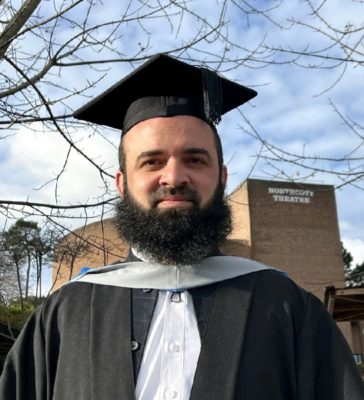
Muhammad Ilyas
Current Employer/Organisation Name
University of Copenhagen; University of Adelaide
What have you been doing since leaving Exeter, and what are you doing now?
After leaving Exeter, I took a short break from academia for personal reasons while making arrangements to start my PhD. During my dissertation at Exeter, I secured an exciting PhD opportunity, a joint project between the University of Copenhagen, Denmark, and the University of Adelaide, Australia. I officially started my PhD on November 4 2024.
Why did you choose this career? And what do you enjoy most about your work?
I chose this career because of my deep passion for wildlife ecology and understanding the intricate relationships between biodiversity and environmental changes. From a young age, I have been fascinated by the natural world, and my academic journey has always been driven by a desire to make meaningful contributions to conservation and environmental sustainability. What I enjoy most about my work is the opportunity to use data science tools in exploring and modelling complex ecological systems. The interdisciplinary nature of my research, particularly in understanding how large herbivores impact ecosystems, is both intellectually rewarding and personally fulfilling.
Please tell us if you were a member if any societies, groups of sports clubs?
Head brother for SU Islamic Society
What did you enjoy most about your programme and what was the biggest highlight?
I enjoyed the interdisciplinary nature of the program, which allowed me to bridge my passion for ecology with advanced data science techniques. The combination of hands-on coding, statistical modeling, and ecological applications made the experience both intellectually stimulating and highly relevant to real-world challenges. The biggest highlight was working on group projects in the module “Tackling Sustainability Challenges Using Data and Models”. These projects provided valuable insights into various themes of environmental sustainability, from renewable energy to the application of modern technology in ecology. They not only deepened my technical skills but also reinforced my confidence in addressing complex questions using data-driven approaches. Collaborating with supportive faculty and peers throughout the program was another enriching and rewarding aspect.
What did you most enjoy about studying here?
What I enjoyed most about studying here was the pleasant summer weather, which made exploring the beautiful surroundings even more enjoyable. Additionally, the supportive and diverse community allowed me to build meaningful friendships and create unforgettable memories, both academically and personally.
Why did you choose to study at Exeter?
I chose to study at Exeter because of its strong reputation in ecology and environmental sciences, as well as the unique focus of the MSc Applied Data Science (Ecology and Evolution) program. The program’s emphasis on combining cutting-edge data science techniques with ecological applications aligned perfectly with my career aspirations. Additionally, the university’s excellent research facilities, experienced faculty, and beautiful campus environment made it an ideal place for both academic and personal growth. Exeter’s commitment to sustainability and interdisciplinary research further reinforced my decision.
What skills and experiences have been most useful for your career?
The most useful skills for my career have been a combination of fieldwork expertise, data analysis, and effective communication. My hands-on experience in wildlife ecology has given me a strong foundation for understanding ecosystems, while my proficiency with data science tools has allowed me to analyze complex ecological datasets. Additionally, interdisciplinary collaboration and problem-solving have been essential, particularly when working on large-scale projects like my PhD.
What advice would you give to a current student who wishes to pursue your career?
My advice to students is to stay curious and embrace both the fieldwork and analytical aspects of the discipline. Develop a strong foundation in ecological theory and take the time to learn data science tools, as they are increasingly important in modern ecology. Seek out internships or volunteer opportunities to gain hands-on experience, and do not hesitate to network with researchers in your area of interest. Additionally, resilience is key—research often involves challenges and setbacks, but these are part of the learning process. Finally, be open to interdisciplinary approaches, as combining insights from different fields can lead to innovative solutions for addressing ecological problems.
What are your plans for the future?
My future plans revolve around advancing research that contributes to biodiversity conservation and ecosystem management in a changing climate. In the short term, I am focused on completing my PhD, where I aim to uncover insights into the recovery of large herbivores and their role in restoring ecosystem services. Looking ahead, I aspire to continue working in academia or conservation-focused organizations to address environmental challenges. Ultimately, my goal is to contribute to developing strategies that promote sustainable coexistence between humans and wildlife, ensuring the resilience of ecosystems for future generations.

